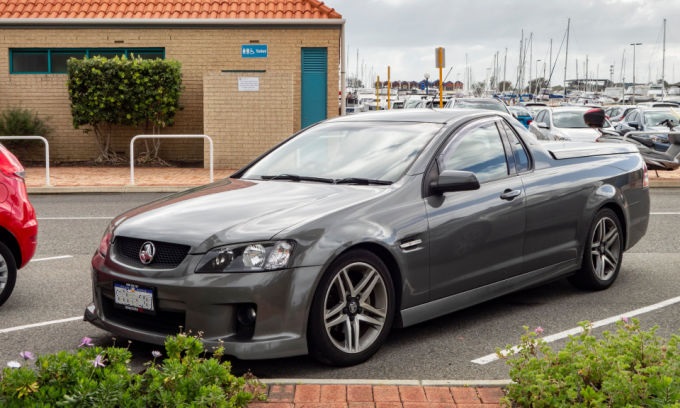KEY POINTS
- Business car insurance is not typically offered as a separate product – instead, you can purchase a standard personal or commercial car insurance policy for business use.
- Car insurance for business use can include personal insurance with business use for occasional work-related driving, or commercial insurance for vehicles used exclusively for business purposes.
- Car insurance for business use may cover activities like traveling to job sites, transporting goods, or carrying employees and clients.
What is car insurance for business use?
Car insurance for business use, or business car insurance, is a type of cover that protects vehicles used for work-related activities. It is designed to cover the extra risks that come with using a vehicle for business purposes, rather than just personal use.
There are two types of business car insurance that may be suitable, depending on your situation:
- Personal car insurance with business use: This may be appropriate if you use your private vehicle for business purposes, such as travelling between job sites or visiting clients. It’s a personal car insurance policy that includes cover for limited work-related use.
- Commercial car insurance: A dedicated policy that is generally designed to cover more specialised vehicles that are used solely for business purposes. This type of insurance is often used for vehicles that form part of a business fleet.
These kinds of policies exist in addition to Compulsory Third Party (CTP) insurance, which is mandatory for all vehicles registered in Australia. Keep in mind that CTP insurance costs can vary across states and territories, as well as different providers.
Compare Top Rated Car Insurance
What is the difference between business and commercial car insurance?
Car insurance for business use of a personal vehicle isn’t the same as commercial motor vehicle insurance. It is typically an extension of an existing private car insurance policy to cover business related activities, often utilised by customers that use their vehicle for both personal and business use. Commercial car insurance, on the other hand, is often used to cover a vehicle or fleet of vehicles that are only used for business purposes.
Business car insurance
Extending your existing private car insurance for business usage may be worthwhile, if you use your car for work, such as in the course of operating a business. This could cover tasks such as driving between different job locations (e.g. a tradesperson), transporting other employees or goods from one location to another (e.g. a sales representative) or transporting customers (e.g. a rideshare driver).
Private car insurance doesn’t normally cover you for business use, apart from driving to and from your place of work. You will need to tell your insurance provider if you intend to use your car for business purposes. If you don’t, then you might not be covered if you have an accident.
Insurance providers that allow you to extend your private car insurance to cover business use may vary in how they define what business use is. It’s important to clarify this by speaking with your provider and reading the Product Disclosure Statement (PDS) and Target Market Determination (TMD) for the policy to make sure the cover is suitable for your situation.
Commercial car insurance
Commercial car insurance is often used to cover vehicles that are exclusively used for business purposes, like a van used by a flower delivery company. Depending on the provider, commercial car insurance may also be used to cover a fleet of vehicles under one policy.
Commercial vehicle insurance policies are typically designed to cover a wider range of vehicle types. including cars, vans, utes, and heavier or specialised vehicles such as forklifts, boats, bulldozers or tractors.
If you need business insurance to cover risk and protect assets such as customers, employees, business owners, earnings and vehicles, then the Australian Government’s Business support website says it can be a good idea to ask providers if they offer insurance packages tailored to your business. Depending on your requirements, this may be cheaper than taking out separate policies.
What does business car insurance cover?
Business car insurance is designed to cover you from a range of risks, such as the cost of repairing damage to your vehicle or someone else’s property. The exact kind of protection you get from a car insurance policy for business use depends on what options you choose and the level of cover you take out.
Any inclusions and exclusions are generally similar to those that come with a car insurance policy taken out for private use. There may be extras you can choose from that offer greater protection, such as windscreen replacement, roadside assistance and rental car use, but they may also add to your premium costs. The cover offered as part of a commercial car insurance policy tends to be more specialised, particularly in the case of a comprehensive policy.
Below are some examples of what may be covered, based on the policies of a number of providers in Australia. What’s actually covered by a policy can vary considerably from provider to provider, so it’s worth double checking the inclusions, exclusions and limits by reading any PDS and TMD documents.
Third party property damage insurance
This type of third party insurance covers you if the insured vehicle(s) injure someone or cause damage to their property.
Third party fire and theft insurance
Third party fire and theft insurance covers you for the same things as third party property damage, as well as for loss or damage to your vehicle(s) resulting from events such as fire, lightning, explosion, theft or attempted theft. Some policies may also cover damage to your vehicle caused by an uninsured third party.
Comprehensive cover
Comprehensive commercial car insurance covers everything included on the other coverage levels, as well as a variety of additions that will vary depending on the provider. Some of the additions covered and other features on offer may include:
- Damage caused to your vehicle in an accident even if you’re at fault.
- Damage or loss of personal items inside the vehicle as a result of an insured event.
- Damage or loss of tools of trade.
- Damage or loss of signage, such as advertising that forms a permanent part of the vehicle.
- Replacement of your vehicle with a new one of the same or similar type, if your vehicle is declared to be a total-write off.
- Emergency repairs required after an insured event to get the vehicle to its destination or to a repairer.
- Emergency travel if the vehicle is deemed unroadworthy following an insured event.
- Emergency accommodation if needed following an insured event.
- Towing and storage costs incurred following an insured event.
- Vehicle car hire costs following theft of the insured vehicle.
- Payout of any amounts owing on financed or leased vehicles following a total-write off.
Keep in mind that what’s included and what’s not could vary from provider to provider and across their different policies. It’s important to read the relevant policy documentation when comparing your car insurance options.
What does business car insurance not cover?
Business car insurance or commercial car insurance policy exclusions will depend on the level of cover you take out and the insurance provider you choose.
Some potential exclusions may include:
- Certain kinds of vehicles and their commercial or business purpose, like taxis, rideshares (although it may be possible to get rideshare car insurance via some providers), emergency vehicles and heavy vehicles operated by a driver below a specified age.
- Damage or loss incurred if the driver of the vehicle is under the influence of alcohol or drugs.
- Theft or loss, if reasonable care has not been taken to secure the vehicle.
- Loss of income or revenue resulting from an insured event.
- Claims made if the vehicle was already damaged, unsafe or unroadworthy.
- Damage resulting from general wear and tear.
- Risks that are covered by CTP insurance.
Other exclusions and limits may apply. Check with your provider or read the policy’s PDS and TMD for more details.
Does car insurance cover business equipment?
Some comprehensive car insurance policies may provide limited cover for business equipment, such as tools, computers, or other personal effects stored in your vehicle. However, this coverage may be subject to conditions like secure storage or capped at a specific value.
It’s important to note that not all policies automatically include this cover, and you may need to add optional extras or purchase a separate insurance policy for business tools and equipment. To ensure your policy suits your needs, it’s important to check the PDS for specific inclusions and exclusions. It can also be worth comparing different options before making a decision.
How do you get business car insurance?
Finding the best business car insurance for you will depend on your needs and the type of policy you’re looking for. For certain policies, you may be able to compare options online or apply directly with an insurance provider. If purchasing online, many providers offer a first year discount for doing so.
For more specialised or complicated policies, you can discuss your needs with a car insurance broker who can recommend providers. As part of the application for business car insurance, you’ll usually be asked to provide detailed information about your business and the vehicle(s) being insured, such as:
- the type of car being insured,
- how old the car is,
- the average number of kilometres it’s driven per year,
- the type of coverage you require,
- if the car has been modified,
- who’ll be driving the car,
- whether the car is being used to carry passengers in exchange for payment e.g. a taxi or rideshare
- and whether the car will be used to make deliveries or transport goods for a fee.
Based on this, the provider will give you a quote outlining what they’ll cover and at what cost.
Can you insure a car using a business name?
According to a number of insurance providers we’ve researched, the vehicle will need to be insured under the same name as it’s registered. If the vehicle is insured in the name of a person, the insurance provider may still request that the name of the associated business be provided. This may also be listed on the policy. For example, even if the vehicle is insured under a person’s name, any business use cover may only extend to activities carried out for a specific named business.
What is the difference between private and business car insurance?
Private car insurance is designed to cover a vehicle that is used for personal use. Private car insurance typically does not extend to covering business activities, unless you specify that the vehicle will also sometimes be used for those purposes, and the provider offers business use cover. Business use cover, or specific commercial car insurance policies, are designed to cover vehicles that are used in the course of running a business.
Is personal or business car insurance cheaper?
The cost of a personal car insurance policy relative to a business one will depend on a range of factors specific to the vehicle and the person or business insuring them. The more expensive option can vary on a case by case basis.
If you’re adding business cover to a private car insurance policy (depending on the type of business activity), the insurance provider may decide that this adds to the risk that you will need to make a claim. If this is the case, then it’s likely that the premium will be higher than a policy solely covering the driver for personal use.
Is business car insurance mandatory?
If your vehicle is registered to be driven on the road, it needs to be insured under at least a CTP policy, regardless of where in Australia you live or do business. Other forms of business car insurance are generally not mandatory but can be valuable in protecting your business from unexpected costs or disruption if your vehicle is lost or damaged. If you’re considering becoming a rideshare driver, it’s also important to review your car insurance and talk to your provider.
Compare car insurance policies
If you’re comparing car insurance policies, the comparison table below displays some of the policies currently available on Canstar for a 30-39 year old male seeking comprehensive cover in NSW without cover for an extra driver under 25. Please note the table is sorted by Canstar Star Rating (highest to lowest) followed by provider name (alphabetical) and features links direct to the providers’ websites. Consider the Product Disclosure Statement (PDS) and Target Market Determination (TMD), before making a purchase decision. Contact the product issuer directly for a copy of the PDS and TMD. Use Canstar’s car insurance comparison selector to view a wider range of policies. Canstar may earn a fee for referrals
Cover image source: Mino Surkala/Shutterstock.com








